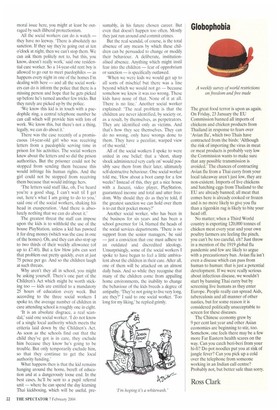Sex and violence begin at 12
Rod Liddle says that children in care are out of control and social workers can do nothing about it When they speak, it is with the lilting cadences of Jamaican street slang. And the vocabulary, too: bling, baad, bitch, ras, ho and, of course, inevitably, motherf***er. This would be understandable if they were Jamaican street children, or even black British street children. But they're not, they're white. Many of them have never seen a black person in the flesh. So where did the accent come from?
It's presumably aspirational, acquired from the industrial effluent which passes, right now, for youth culture. It is one of the many little pleasures to be had from working with these kiddies. The children I'm telling you about are problem children; not inner-city problem children, but the benighted offspring of our market towns. They're the ones who, aged between 12 and 15, are in what are inaccurately called local authority 'homes', at a cost of roughly £70,000 per year per child. I've been speaking to three residential social workers who have had, by now, enough. They want to help these horrid little people but they can't — the law won't let them. Everything they try to do seems to be an infringement of the children's human rights.
All of the children take drugs. If they didn't when they arrived at the home, peer pressure ensures that they soon do. And there is perpetual sex and violence. In one home the going rate for a blow job was 75 pence. Then a new girl joined and undercut the price, charging only 50 pence. So the others kicked her head in. If you're not appalled at the moral issue here, you might at least be outraged by such illiberal protectionism.
All the social workers can do is watch — they have no leeway. 'There is absolutely no sanction. If they say they're going out at ten o'clock at night, then we can't stop them. We can ask them politely not to, but this, you know, doesn't really work,' said one residential care worker. So a 14-year-old rent boy is allowed to go out to meet paedophiles — as happens every night in one of the homes I'm dealing with here — and all the social workers can do is inform the police that there is a missing person and hope that he gets picked up before he's turned another few tricks. But they rarely are picked up by the police.
'We know this kid is in touch with a paedophile ring, a central telephone number he can call which will provide him with lots of work. We know this, but there's not a thing, legally, we can do about it.'
There was the case recently of a promiscuous 14-year-old girl who was receiving letters from a paedophile serving time in prison for his activities. The social workers knew about the letters and so did the prison authorities. But the prisoner could not be stopped from sending them because this would infringe his human rights. And the girl could not be stopped from receiving them because that would infringe hers.
The letters said stuff like, oh, I've heard you're a good shag, I can't wait til I get out, here's what I am going to do to you,' said one of the social workers, shaking his head in exasperation. 'And there is absolutely nothing that we can do about it.'
The greatest threat the staff can impose upon the kids is to withhold the use of the house PlayStation, unless a kid has pawned it for drug money (which was the case in one of the homes). Oh, and they can also stop up to two thirds of their weekly allowance (of up to £7.40). But a few blow jobs can sort that problem out pretty quickly, even at just 75 pence per go. And so the children laugh at such threats.
Why aren't they all in school, you might be asking yourself. There's one part of the Children's Act which might be worth sticking too — kids are entitled to a mandatory 25 hours of education every week. But according to the three social workers I spoke to, the average number of children in care attending school is roughly one in eight.
'It is an absolute disgrace, a real scandal,' said one social worker. 'I do not know of a single local authority which meets the criteria laid down by the Children's Act. As soon as the schools find out that the child they've got is in care, they exclude him because they know he's going to be trouble. But only temporarily exclude him, so that they continue to get the local authority funding.'
What happens then is that the kid remains hanging around the home, bereft of education and at a dangerously loose end. In the best cases, he'll be sent to a pupil referral unit — where he can spend the day learning Thai kickboxing, which will be useful, pre
sumably, in his future chosen career. But even that doesn't happen too often. Mostly they just run around and commit crimes.
But the real scandal, of course, is the total absence of any means by which these children can be persuaded to change or modify their behaviour. A deliberate, institutionalised absence. Anything which might instil fear into the children — fear of opprobrium or sanction — is specifically outlawed.
'When we were kids we would get up to all sorts of mischief but there was a line beyond which we would not go — because somehow we knew it was too wrong. These kids have none of that. None of it at all. There is no line.' Another social worker explained: 'The real problem is that the children are never identified, by society or, as a result, by themselves, as perpetrators. They are identified only as victims. And that's how they see themselves. They can do no wrong, only have wrongs done to them, They have a peculiar, warped view of the world.'
All of the social workers I spoke to were united in one belief: that a 'short, sharp shock administered very early on' would possibly save them from their later, ultimately self-destructive behaviour. One social worker told me, 'How about a boot camp for a few weeks? Instead of this, they get a nice house with a Jacuzzi, video player, PlayStation, guaranteed income and total and utter freedom. Why should they do as they're told, if the greatest sanction we can hold over them is to cut their pocket money?'
Another social worker, who has been in the business for six years and has been a school governor for 14, blamed the heads of the social services departments. 'There is no support from the senior managers,' he said — just a conviction that one must adhere to an outdated and discredited ideology. Unsurprisingly, some of the social workers I spoke to have begun to feel a little ambivalent about the children in their care. After all, one of them will be attacked on an almost daily basis. And so while they recognise that many of the children conic from appalling home environments, the inability to change the behaviour of the kids breeds a degree of antipathy. 'They're not going to live very long, are they?' I said to one social worker. 'Too long for my liking,' he replied grimly.



























































 Previous page
Previous page